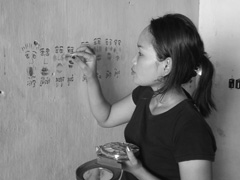Paper Cannot Wrap Up Embers
Le papier ne peut pas envelopper la braise FRANCE / 2006 / Cambodian / Color / Video / 86 min
FRANCE / 2006 / Cambodian / Color / Video / 86 min
Director: Rithy Panh
Photography: Prum Mésar
Editing: Marie-Christine Rougerie
Sound: Sear Vissal
Music: Marc Marder
Producers: Catherine Dussart, Gérald Collas
Production Companies: CDP, INA
World Sales: INA (Michèle Gautard)
Phnom Penh, Cambodia. The sleeping quarters of prostitutes, who take abuse from their clients and the madam who employs them, and spend their days haunted by nightmares like HIV infection. This requiem to these dying souls at the bottom of a broken-down society deeply scarred by civil war unfolds with sorrow, and, on occasion, beauty.
[Director’s Statement] “Paper cannot wrap up embers.” These words uttered by a prostitute encapsulate the tragic circumstances of women forced into prostitution because of poverty or their family situation. They come from the countryside without a clue, lacking the funds to “buy” a factory job. Day after day, they are exposed to violence from their employers and clients, and scorned by their families as well. In exchange, a mere $80 each month in payment for their boundless suffering. Then loan payments and fines are deducted, so they never see that full amount.
A simple plastic sheet and trunk serving as a chest of drawers are all you find in the two rooms shared by five prostitutes, leading a precarious life in the heart of Phnom Penh. They spend their scant money sustaining the illusion of being integrated into consumer society. Escape from this life they call a “dunghill” is basically impossible.
It all started in 1979: the civil war that continued for years, mass killings by the Khmer Rouge, unpunished crimes, new competition to make money, a gap between the rich and poor, and ceaseless violence by the powerful . . . Through the prostitutes’ stories, this film brings into question the present day of destroyed Cambodia.
Da, the film’s storyteller, and her fellow prostitutes are from the postwar generation who grew up in refugee camps. They struggle with the burden of the past in a world enveloped in death and disunity. What of the importance of helping each other, friendship, and justice? What is their position? The future of youth that can’t sustain identity? Where can they find support for living? Their questions are problems faced by many of the 13 million people in Cambodia today.
Prostitutes are always forced into silence. People who are treated as samples in statistics and NGO reports, people who hide in the shadows of the fight against AIDS and human trafficking—I wanted to come face to face with them from a different perspective and to hear their voices. Faces, voices, and names. Being with them. Hearing their stories on their own turf, not in bars or karaoke rooms. Their words rise against the negation of humanity.
 Rithy Panh
Rithy Panh
Born in Phnom Penh, Panh graduated from the Institut des Hautes Études Cinématographiques (IDHEC), Paris. He has made numerous award-winning theatrical and documentary features. Site II (1989) won the Grand Prize at the Amiens International Film Festival. Neak Sre: The People of the Rice Field (1994) and One Fine Evening after the War (1997) were shown at the Cannes Film Festival, and the latter was screened at the Tokyo International Film Festival in 1998. Other works awarded prizes at international film festivals include Bophana, a Cambodian Tragedy (1996) and The Land of the Wandering Souls (2000), awarded the Robert and Frances Flaherty Prize at YIDFF 2001. S21, the Khmer Rouge Killing Machine (2002) won the Runner-up Prize at YIDFF 2003. The People of Angkor (2003) was screened at YIDFF 2005, and The Burnt Theater (2005) at TOKYO FILMeX 2005. “Hommage à Rithy Panh” was held at the Institut Franco-Japonais de Tokyo in July 2007. Paper Cannot Wrap Up Embers was awarded the FIPA d’Or 2007. |
